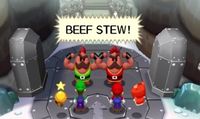Lil' Massif
| Lil' Massif | |
|---|---|
| Species | Hooski |
| First appearance | Mario & Luigi: Dream Team (2013) |
Lil' Massif is a character who appears in Mario & Luigi: Dream Team. He works as a tour guide along with his brother in the real world.
At Wakeport, the Bros. meet Lil' Massif who claims that the Mount Pajamaja tour cannot start unless Big Massif shows up. The Bros. eventually find Big Massif after a long trek in the Dream World, and the tour starts. Mario and Luigi eventually reach the summit of the mountain, learning some helpful moves taught to them by the Massifs along the way. The Massifs flee when they see the guardian of the summit (after briefly reverting to their immobile statue form), then decide against summiting the mountain after seeing Bowser, Antasma, and several of Bowser's minions, and are not seen again until the Mario Bros. decide to scale the mountain a second time in order to get the Pajamaja Rock Frame. The Massifs accompany them and teach Mario and Luigi the Ball Hop move on the way to the location of the bed frame. They also appear in Dreamy Mount Pajamaja as shopkeepers.
Names in other languages
| Language | Name | Meaning | Notes |
|---|---|---|---|
| Japanese | マッスフオトー[?] Massufu Otō |
A distortion of「マッシブ」(masshibu, massive) and/or「マッスル」(massuru, muscle) +「弟」(otōto, younger brother) | |
| German | Muskulini[?] | ? | |
| Italian | Muscobaffo verde[?] | From "muscolo" (muscle) and "baffo" (mustache) + "verde" (green) | |
| Korean | 머슬아우[?] Meoseul'au |
Muscle Younger Brother | |
| Portuguese | Musculino[?] | Diminutive of "músculo" (muscle) | |
| Russian | Бамбуло-младший[?] Bambulo-mladshiy |
Younger Bambulo. Bambulo cames from African fighter Salvator Bambula whose name was used in Russian proverb which begins with "Silach Bambula podnyal chetyre stula" ("The strongman Bambula raised four chairs") | |
| Spanish (NOA) | Juanchi[?] | Likely a diminutive of "Juancho" (Big Massif) | |
| Spanish (NOE) | Musculín[?] | From "músculo" (muscle) and the diminutive suffix "-ín" |
Trivia
- He and Big Massif use the word "beef" in most of their sentences.
